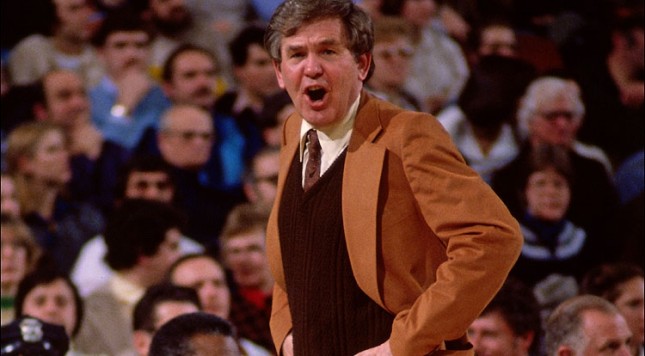Over the past few days, we’ve looked at players who should be in the Basketball Hall of Fame, players who were not part of the HOF Class of 2015. As last weekend’s induction ceremonies begin to fade from view, it’s important to also include some of the coaches who have not yet gotten called to Springfield for their moment in the sun.
Among all the NBA coaches who haven’t been welcomed into basketball’s exclusive club (and who are eligible for inclusion), it’s hard to come up with another more deserving recipient of such an honor than Bill Fitch.
When we looked at the 1976 Cleveland Cavaliers on the eve of the 2015 NBA Finals, Fitch was the coach of the team. Fitch rode out several rough seasons — taking some hits in terms of his all-time winning percentage — so that the Cavs could be built patiently and meticulously. The 1976 season was the payoff, as Cleveland pushed the eventual world champion Boston Celtics to six games. It’s hard to argue with Fitch’s body of work in Ohio. He took an expansion franchise and turned it into a three-time playoff team before his tenure with the Cavs ran out of steam. Fitch had to wonder where his next job would lead him.
The answer was better than his wildest hopes and expectations… but what’s important to emphasize is that Bill Fitch was worthy of the task entrusted to him.
Fitch was asked to take over the Boston Celtics and a young player they had just drafted — a player by the name of Larry Bird. Sure, Bird was a transcendent generational talent, but Fitch still had to mold him and his teammates into champions. This, Fitch did in 1981. The Celtics overcame a 3-1 series deficit in the Eastern Conference finals against the Philadelphia 76ers and earned the right to face a barely-above-.500 Houston Rocket club in the NBA Finals. Though the core of that Celtics team was largely new to the spotlight of the Finals, it handled the Rockets and brought a championship back to Boston.
The Celtics didn’t defend their title the next season, which might perhaps lead some critics to question Fitch’s coaching acumen, but it’s not as though Boston slacked or slumped in the 1981-1982 season. The Celtics and Sixers met on the mountaintop and played a gloriously thrilling seven-game series. Julius Erving and “The Boston Strangler,” Andrew Toney, were just a little bit better.
Celtics fans were hardly bitter about the defeat, so it’s not as though the response to the 1982 East Finals was marked by displeasure in the performance of that Boston team — only the result was lamentable. Boston fans were so admiring of the Philadelphia club which overcame its own demons in that ’82 East Finals series that they chanted, “Beat L.A.!” at the end of Game 7, when it had become apparent that the Sixers would meet the Lakers in the NBA Finals. Bill Fitch did not do a poor job with the 1982 Celtics. The Sixers dug in and got a little better after being not quite good enough in 1981.
*
After leaving Boston, Fitch just happened to go to Houston to coach the Rockets, the team he had defeated to win his first (and as it would turn out, only) NBA title as a head coach. Fitch did have the Twin Towers of Ralph Sampson and Hakeem Olajuwon on his club, but he had to:
A) keep both of them happy and devise a way for both of these giants to be effective on the floor;
B) make sure that as young players, they became attuned to what they needed to do to become elite professional players, not just a couple of really tall and rangy guys who took shortcuts because of their physical gifts.
Sampson’s career didn’t endure because injuries cut it short. Olajuwon, on the other hand, became one of the 50 best players of all time. Fitch’s job in tutoring his two big men has to be given high marks. The fact that his Rockets were the only Western Conference team to ever defeat the Los Angeles Lakers in a best-of-seven series during the entire 1980s (and also the only West team other than the Lakers to make the NBA Finals after playing a series which lasted at least five games) could, by itself, recommend Fitch for the Hall of Fame.
That Fitch also has a world title (with Boston) and a supreme rebuilding success on his resume (with Cleveland) gives him three highly significant coaching achievements in three different cities.
Come on here — why is Bill Fitch not in the Hall?
That’s a priority for 2016, to be sure.

